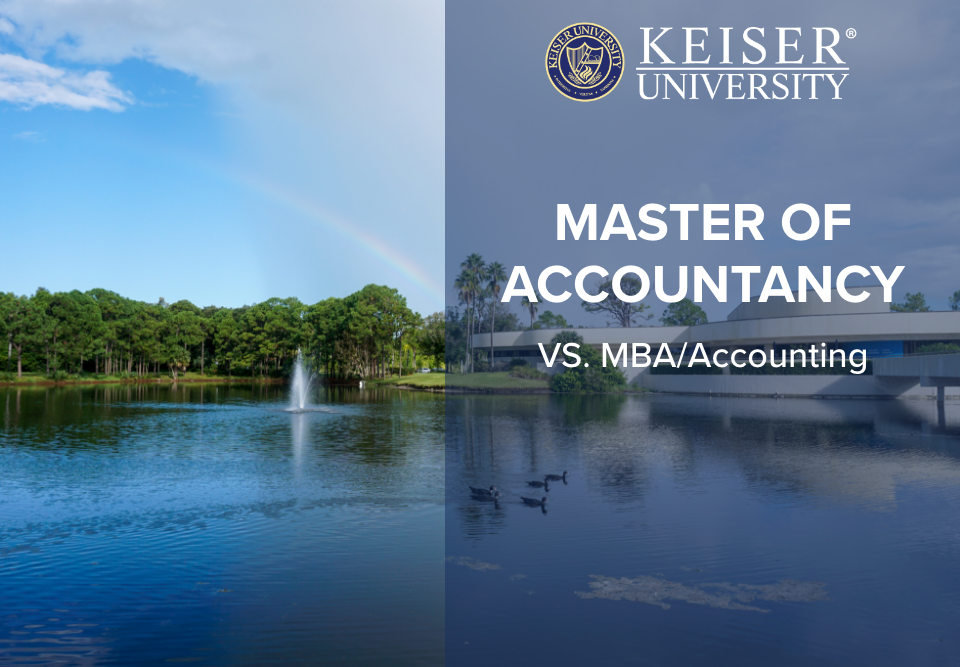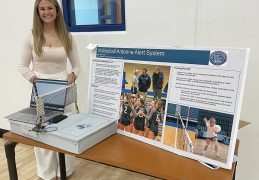Earning a master’s degree in accounting is the perfect way to take your career to the next level, especially if you want to increase income potential throughout your career. Upon graduation, you’ll be more qualified for better-paying positions. In fact, a master’s degree is often a prerequisite for many senior-level accounting positions.
Two popular advanced educational paths for accounting professionals include a Master of Accountancy (MAcc) and a Master of Business Administration (MBA) with a concentration in accounting.
Many students choose to continue working while pursuing their master’s degree. Keiser University’s online MAcc and MBA/Accounting degree programs are perfect for professionals who want to continue their careers while pursuing an advanced degree, either full- or part-time.
Most graduate-level accounting programs fall into two categories – a MAcc or an MBA/Accounting degree. This may leave you wondering about the differences between the two programs and the critical distinctions you should consider when deciding which program is right for you.
Let’s look at each of these degree programs a little closer, with the help of Dr. Diann Ferrell, CFE and Master of Accountancy Department Chair at Keiser University.
What Is a Master of Accountancy?
A Master of Accountancy (MAcc), also known as a master’s in accounting or a master’s in accountancy, dives deep into the accounting field. Although it overlaps many of the same core accounting courses as someone pursuing an accounting MBA, a MAcc takes your accounting knowledge to the next level with additional highly focused courses. It’s a specialized degree that focuses on developing technical competencies and delves into the study of financial topics such as auditing, taxation, and cost analysis.
Master of Accountancy degree programs feature general business concepts related to communication, ethics, and management. A MAcc prepares business professionals for careers as accountants, certified public accountants, certified management accountants, certified fraud examiners, corporate controllers, accounting managers, consultants, entrepreneurs, and chief financial officers.
Most MAcc programs target applicants who already have an accounting background. When comparing a MAcc to an MBA with a concentration in accounting, mathematically inclined students view the MAcc as their best option because it builds on their accounting strengths. Utilizing a financially focused and integrated approach, a MAcc prepares students to meet the ever-changing needs and challenges they will face in today’s modern, fast-paced work environment.
What Is an MBA in Accounting?
An MBA with a focus in accounting prepares students to work in managerial positions. They may be responsible for overseeing teams of accounting professionals (including Certified Public Accountants, or CPAs). This degree program exposes students to broader business principles while also cultivating competencies. The MBA/Accounting increases graduates’ understanding of essential business principles and practices, such as leadership and management skills. An MBA with a focus in accounting prepares graduates for managerial positions such as human resource manager, operations manager, financial analyst, and project manager.
Courses help future managers develop a broader understanding of business and accounting. Topics covered in an MBA program with a concentration in accounting include:
- Advanced Financial Reporting and Analysis
- Audit
- Cost/Managerial Accounting
- Fraud
- Professional Accounting Research
- Tax
Unlike the MAcc, an MBA in accounting accepts a bachelor’s degree in any business-related field as a prerequisite, from management to accounting to economics. Students need an accounting undergraduate degree, or they may take the required prerequisite courses at Keiser.
Differences Between MAcc & Accounting MBA
The skills obtained in both a MAcc and an accounting MBA are important in shaping business strategies. This is why a master’s degree is often a distinguishing factor for prospective employers who consider a graduate degree as validation of advanced skills. But what are the differences between the two?
Dr. Ferrell explains, “The MBA is for people that want an MBA and realize they need accounting skills to be an effective leader or entrepreneur. Maybe they have seen the demand for accounting jobs, or perhaps they are working as bookkeepers. Whatever the reason, they have an interest in the numeric part of the degree program.”
She continues, “The Master of Accountancy is usually for those with bachelor’s degrees in accounting, though not always. They could be international students who are already professional accountants that are certified in their country, but they need to take courses to meet the criteria of a state board of accountancy where they intend to practice.”
Now that we have a better understanding, let’s look at certain aspects of the two programs.
Career Goals/Outlook
When you compare a MAcc to an accounting MBA, you’ll find that despite some overlap, the selection of one over the other largely comes down to career goals and personal preference.
As Dr. Ferrell explained, the MAcc is typically best for those interested in an accounting career. MAcc graduates often aspire to pursue additional certifications (like a CPA) and are looking to deepen their existing understanding of accounting.
On the other hand, an accounting MBA has a broader focus, covering various managerial topics such as economics, finance, international operations, or marketing, while also developing competencies and a good understanding of critical business practices such as leadership and management.
Undergrad and Past Work Experience
Since the MAcc concentrates on advanced accounting skills, individuals who have not had the required prerequisites will need to take additional coursework to prepare themselves for the advanced accounting and compliance courses that are in the program.
For those pursuing an MBA, some work experience may qualify for college credit since the MBA also focuses on the broader business side of things.
Accounting Certifications or Designations
MAcc curriculum typically meets the educational requirements to sit for certifications such as the CPA exam; however, MBA accounting curriculum meets most of the requirements to sit for certification exams; however, candidates may need to take additional courses to qualify for the exams.
Common accounting-related certifications include:
- CPA – Certified Public Accountant
- CMA – Certified Management Accountant
- CFE – Certified Fraud Examiner
- CRFA – Certified Forensic Accountant
- CIA – Certified Internal Auditor
- CISA – Certified Information Systems Auditor
- CFSA – Certified Financial Services Auditor
- CHA – Certified Housing Accountant
- EA – Enrolled Agent
Most certifications are granted by the state where individuals intend to practice. The EA designation, however, is a certification awarded by the Internal Revenue Service and allows qualified individuals to practice in all 50 states.
Getting a CPA
Suppose you plan to sit for the CPA exam. In that case, the benefits of a MAcc degree serve multiple purposes by furthering your accounting knowledge while also giving you the required credits to sit for the exam.
A CPA (Certified Public Accountant) license is an official, government-supported credential given to accountants who pass the Uniform CPA Examination and meet all the requirements of their state’s board of accountancy or examiners.
CPA certification endorses an accountant’s auditing, taxation, regulatory compliance, and financial analysis skills. Many employers need CPA certified accountants for their work; therefore, having CPA licensure often boosts earnings potential, job security, and career outlook.
Credits Required
CPA certification requires that individuals obtain 150 semester credit hours and pass the Uniform CPA Examination. Some jurisdictions provide provisional CPA exam approval to individuals with 120 college credits, with certification issued upon completion of all 150 credits and other requirements.
Do You Need a CPA?
Certified CPAs are licensed to work in public accounting and have more authority than private accountants. According to IRS guidelines, only CPAs and EAs are legally permitted to represent clients in tax court in front of the IRS.
CPA certification is often required by those who work:
- In accounting firms
- As internal auditors
- As corporate accountants
- As Chief Financial Officers (CFOs)
- In financial advisory services
- In specialized areas of accounting
- For the federal government
- In teaching positions
But do you really need a CPA certification?
In reality, CPAs are one subset of the accounting profession. Dr. Ferrell shares, “To be an accountant, you just need an accounting degree. You don’t need to be certified, but if you are certified, it adds to your value. It might give you an edge over another person in the job market.”
CPA Exam
Divided into four sections, the CPA exam is a sixteen-hour assessment covering the following:
- Business environment and concepts
- Financial accounting and reporting
- Auditing and attestation
- Regulation
Although the CPA exam is the same for all candidates, each state may have differing requirements.
Master of Accountancy vs. MS in Accounting
With an emphasis on highly focused courses, a Master of Accountancy (MAcc) professional track degree is for individuals who want to take their accounting knowledge to the next level. The MAcc program often targets mathematically inclined students, but an expert knowledge of advanced mathematics is actually not necessary for success in accounting.
The Master of Science in Accounting/Accountancy (MS in Accounting) program, on the other hand, generally includes more STEM-based courses and is often math and analytics intensive.
Why Get an MBA Concentration in Accounting
An MBA concentration in accounting helps you develop managerial and leadership skills. It also develops your ability to analyze complex business challenges from an international perspective. Dr. Ferrell shares, “An MBA focuses more on the business side. Students take economics, finance, and other business-related subjects.”
However, individuals pursuing an MBA do not take fraud-related courses and would not be prepared to sit for the fraud exam to become certified fraud examiners. Instead, those who want to become certified fraud examiners should pursue a MAcc.
Master’s Degree and Salary
According to the US Bureau of Labor Statistics (BLS), as of May 2021, the average annual income for accountants and auditors with bachelor’s degrees is $77,250. Although the top ten percent of earners make more than $128,970 annually, most do not. Obtaining a master’s degree and completing a certification in a specific field of accounting can improve salary and job prospects.
The job outlook for accountants and auditors is expected to increase by six percent between 2021 and 2031.
What About Finance Degrees?
Are accounting degrees and finance degrees the same? Dr. Ferrell clears things up for us. She states, “Many people use the terms accounting and finance interchangeably, but there really is quite a difference. If you work in a financial setting, you’re probably going to enter the insurance industry or perhaps become a stock market broker. But oftentimes, they work for insurance companies.”
Keiser even has a new FinTech program (Master of Science in Financial Technology), a partnership between finance and technology for those interested in a finance degree program. Keiser’s FinTech master’s degree program covers a wide range of current and emerging technologies for financial services.
Find the Right Accounting Grad Program for You at Keiser
If you wish to propel your career forward with a master’s degree in accounting, Keiser’s master’s programs take your career to the next level and can prepare you to sit for the CPA exam. Dr. Ferrell shares, “A master’s in accounting helps assure you of jobs in the future because many jobs open up to people with an accounting degree. They could do bookkeeping for people, work from home, or even acquire a CPA firm and employ others. There’s a world of opportunity and many jobs for people with an advanced accounting degree.”
Are you ready to grab your part of the accounting world? Whether you want to pursue a Master of Accountancy (MAcc) or an MBA in Accounting, Keiser University can help you. Contact us to learn more!






 My instructors believed in me. They were more than instructors, they tried to get to know you as a person and tried to understand your goals so they could push you towards them. Student services helped me find a job before I even graduated. Everyone was dedicated to my overall success.
My instructors believed in me. They were more than instructors, they tried to get to know you as a person and tried to understand your goals so they could push you towards them. Student services helped me find a job before I even graduated. Everyone was dedicated to my overall success.
